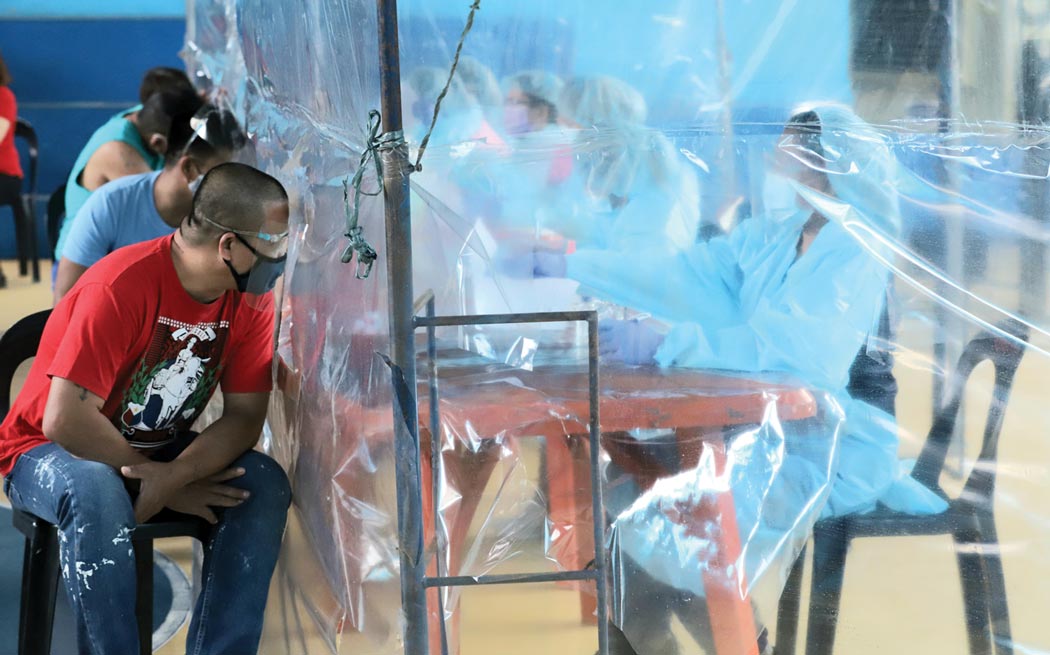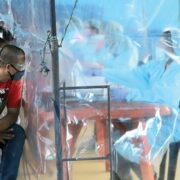
THE new and more infectious variant of COVID-19 first reported in the United Kingdom has reached the Philippines.
The Philippine Department of Health (DOH) and the Philippine Genome Center (PGC) on Wednesday, January 13, confirmed the detection of the B.1.1.7. SARS-CoV-2 variant (UK variant) in the country after samples from a Filipino who arrived from the United Arab Emirates (UAE) on Jan. 7 “yielded positive genome sequencing results.”
The patient is a 29-year-old male resident of Quezon City who left for Dubai on Dec. 27, 2020 for business purposes and returned to the Philippines last Jan. 7 via Emirates Flight No. EK 332.
He was swabbed and quarantined at a hotel upon arrival, the agencies reported.
The positive test result was released the following day and the patient was referred to a quarantine facility in Quezon City while his samples were sent to PGC for whole genome sequencing.
The patient also travelled with his female partner, who tested negative but remains under strict quarantine and monitoring.
Both Filipinos had no exposure to a confirmed case prior to their departure to Dubai nor had any travel activities outside Quezon City, according to the DOH.
“Immediate contact tracing was done in close coordination with the QC government, and the initially identified contacts are asymptomatic and current under strict home quarantine,” the agency added.
The DOH assured that it is working closely with the QC government to ensure timely and effective measures are in place to mitigate transmission.
It also said that it has secured the flight manifest of the flight in question and contact tracing of other passengers is now underway.
Passengers aboard Emirates Flight No. EK 332 were advised to get in touch with their Barangay Health Emergency Response Teams (BHERTs).
The DOH vowed to intensify its weekly genomic biosurveillance among incoming passengers, local cases, re-infected patients, and those with reported clustering of cases.
The agency also coordinated with the country’s Department of Interior and Local Government (DILG) for the expansion of contact tracing to include third-generation close contacts for known B.1.1.7 cases, who will all have to undergo 14-day facility-based quarantine.
PH grants Pfizer EUA
A day after the country confirmed its first case of the new COVID-19 variant, the Philippine Food and Drug Administration granted an emergency use authorization (EAU) for Pfizer and BioNTech’s vaccine.
“After a thorough review of the currently available data by medical and regulatory experts, the FDA today is granting an emergency use authorization to Pfizer-BioNTech COVID-19 vaccine,” FDA director-general Eric Domingo said Thursday.
“It is decided that all conditions for an EUA are present and that the benefit of using the vaccine outweighs the known and potential risks,” he added.
The decision came 22 days after the American pharmaceutical firm submitted its application in the country.
According to Domingo, Pfizer’s application satisfied the requirements for acquiring an EUA in the Philippines.
“Based on the totality of evidence available to date, including data from adequate and well-known controlled trials, it is reasonable to believe that the Pfizer-BioNTech COVID-19 vaccine may be effective to prevent, diagnose, or treat COVID-19,” he said.
Pfizer’s vaccine requires a storage with a temperature of -80 to -60 degree Celsius prior to dilution.
The EUA stated that Pfizer Inc. Philippines would provide the appropriate cold chain requirements for storage, transport, and handling until the vaccines are delivered to inoculation sites, unless it has an agreement with the DOH or the National Task Force against COVID-19 providing otherwise.
Earlier, Philippine vaccine czar Carlito Galvez Jr. said Pfizer COVID-19 vaccine rollout may start as early as February through the COVAX facility, a global platform that aims to ensure fair and equitable access to COVID-19 vaccines for all countries.
The Philippines is the latest country to issue an EUA for Pfizer’s vaccine, following the United Kingdom, United States, Canada, Saudi Arabia, Singapore, Germany, Australia, and Israel, among others.
Sinovac submits EUA application
Meanwhile, China’s Sinovac has sent in its application for an EUA of its COVID-19 vaccine.
“Yesterday afternoon, nag submit ng application ang Sinovac. Ang EUA nito is from China and they are undergoing pre-assessment now (Yesterday afternoon, Sinovac submitted its application. The EUA it currently has is from China and they are undergoing pre-assessment now),” Domingo said Thursday.
However, he noted that the documents submitted by the company were incomplete.
“At quick glance, the clinical trial data that they sent is still lacking. We will have to ask them for the clinical trial phase 3 report, which I believe they are collating now,” he said.
On Monday, the Philippines secured 25 million doses of Sinovac vaccines, of which the first 50,000 doses are set to arrive in the country next month.
Amid concerns and fears over Sinovac’s low efficacy rate, Philippine President Rodrigo Duterte assured that the vaccine is “as good as” those produced in the U.S. and Europe.
“The bakuna (vaccine) that Secretary Galvez is buying is as good as any other bakuna na naimbento ng mga Amerikano o yung mga Europeans (vaccine invented by Americans and Europeans),” he said Wednesday night.
“Hindi nagkulang ang Chinese. Hindi sila nagkulang sa utak. Bright itong mga Instik. (They don’t lack intellect. They’re bright) and they would not venture kung hindi sapat (if it is not enough), it is not safe, sure, and secure,” Duterte added.






